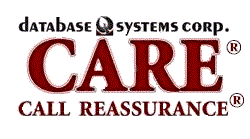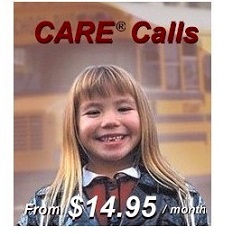


Latchkey Kids Guidelines
 Database Systems Corp. (DSC) provides automatic call processing systems and technology including phone systems that broadcast voice messages to community members. This technology is ideally suited for community service applications.
Database Systems Corp. (DSC) provides automatic call processing systems and technology including phone systems that broadcast voice messages to community members. This technology is ideally suited for community service applications.
DSC provides a complete phone system and software solution called CARE (Call Reassurance) that calls seniors or children left alone at home (sometimes called latchkey kids).
The following article is published by the Mesa Arizona Police and Fire Departments and contains information for parents who have home alone children, particularly after school, before the parents return from work.
Contact DSC to learn more about our CARE latchkey children services and phone systems.
To learn about state laws and guidelines for your state, please visit our latchkey kids age restrictions webpage.
Latchkey Kids: A Guide For Working Parents And Kids Who Stay Home Alone
Who are the latchkey kids?
Millions of American children let themselves in or out of empty houses and supervise themselves for an hour or more each day. Called "latchkey kids" because of the telltale key around their neck or in their pocket, they are usually children of a single parent home or a home in which both parents work. The number of latchkey children is expected to increase as more women enter the work force and as more families experience separation and divorce.
How old should a child be?
Although it is generally agreed that a young child in primary school should not be left alone, age is not the only consideration. Some children might function well at home alone, while others might not be ready to assume the responsibility of self-care. Parents must make an informed decision based on their own child.
In order to be left alone, a child should want to assume the responsibility, should not be afraid to stay alone, should be able to follow directions, and should be able to solve problems independently. Factors such as the amount of time the child will be alone, the accessibility of a parent or another adult in case of emergency and how safe the neighborhood is, should also be taken into consideration.
How can a parent know if a child is ready to be left alone?
The simplest way is to ask the child if he or she wants to stay alone. Most children will answer truthfully. Signs of a child's fearfulness about being left alone include turning on all the lights, having the radio or television on full volume and suffering from nightmares.
How long can a child be left alone?
The time should be kept to a minimum. For older children, three hours per day is probably the absolute maximum. Parents should come home as soon as they can and postpone errands until they can take the child with them. Check with your states laws on when and how long a child can be left home alone.
Can a child be left with an older brother or sister?
Most child development experts agree that no child younger than ten can effectively supervise other children. It is recommended that when an older child is left in charge, all children in the family should be instructed about self-care and be made individually responsible rather than relying on the oldest child to carry responsibility for the others.
What should a parent do to make the latchkey kid experience work?
The experience should be a positive one, reinforcing the child's sense of independence and competence, and minimizing fear and anxiety. Above all, it should be made clear that the parent is in charge, whether physically present or not. A carefully considered set of rules and back-up systems should be developed and discussed with the child so that he or she is aware of what is expected by the parent. The main issue for a parent in deciding if a child can function as a latchkey kid is whether he or she is capable of following agreed rules, completing homework, and accomplishing chores.
How can a family get organized for the latchkey arrangement?
Some families have an initial family conference to discuss the arrangements. They set up house rules, discuss expectations, write down a daily schedule, divide chores, prepare a master phone list, and choose a contact person such as a neighbor or relative to call in case of an emergency. After the conference, the house is organized so that the child can take care of needs such as meals, snacks, homework, entertainment, laundry, and other personal needs. Have regular meetings to discuss changes in schedules, to plan television time and talk about fears and concerns. Don't hesitate to change the rules or a planned schedule that isn't working.
This information provided by the Mesa, Arizona, Police and Fire Departments.
Individual Latchkey Child Signup
DSC provides an easy and secure sign-up procedure (For a quick overview, please visit the registration information web page). Everything can be done using our Latchkey Kids website.
- Online Enrollment - Sign-up online using our secure website.
- Child's Profile - Specify your child's profile (window of time to make calls to your child).
- Name Contacts - Identify who we need to contact if we can't reach your child.
- Secure Payment - Choose one of several enrollment and payment options and pay online using Visa or MasterCard.
DSC provides online and phone management of your account. This lets you view a history of the calls. You can also manage the dates and times for these calls including vacation days.
Plus our service is performed automatically - there are no operators involved so we can ensure your child's privacy.
Create An eCARE Community Account
eCARE is an online service developed by DSC for community organizations or groups that wish to provide CARE services to their members. By creating an eCARE account, you can add one or more members to this account and manage individual schedules and call information as if you had your own CARE phone system. eCARE accounts are designed for groups who do not wish to purchase and maintain computers or lease phone lines. DSC does all of that for you.
You can create and manage a community organization eCARE account for free using our online registration process.
With this account, you can enroll children and other community members using various different profiles including home alone children calls. Individual members of this community receive special discounts when enrolled through a single eCARE account.
Click on the Create eCARE Account link below.
Enter your organization's name, a valid email address along with your own password, and we will establish your eCARE account.
eCARE can now be used as your primary calling program for seniors in your community or can be a backup to any other system that is currently making these calls.
eCARE is a pay-as-you-go service and you only pay for the calls that we make.
Articles About Call Reassurance
CARE Program Demonstration
Our CARE phone reassurance program for latch key children can be managed online. The following is an example of how to use our CARE telephone Reassurance system.
This demonstration shows how a CARE latchkey child is added to our system for calling and how a CARE system administrator can monitor the ongoing operation of our phone reassurance system.
To view this demonstration, click the graphic above.
CARE Information
Contact DSC to learn more about our CARE latch key child services and phone systems.
|




 Database Systems Corp. (DSC) provides automatic call processing systems and technology including phone systems that broadcast voice messages to community members. This technology is ideally suited for community service applications.
Database Systems Corp. (DSC) provides automatic call processing systems and technology including phone systems that broadcast voice messages to community members. This technology is ideally suited for community service applications.


